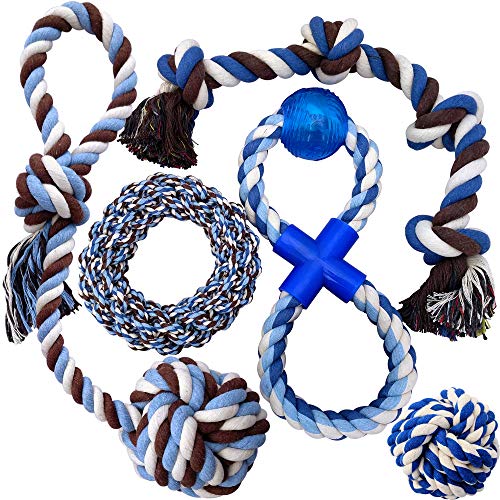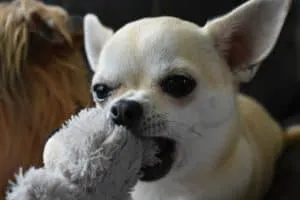If you have ever played with a puppy, you know that they love to use their mouth and teeth while they play. It can be one of the most endearing things about young puppies. But as they get older, it can become a painful problem. There will come the point when you would wonder how to stop your puppy from biting.
Training a puppy to stop biting is not that hard. It is possible to love and play with your new puppy while still training it not to bite.

Petstages Dogwood Durable Dog Chew Toy, Large - Long Lasting Chew Stick Made with Real Wood - USA Made, L
View on Amazon
Otterly Pets Puppy Dog Pet Rope Toys - Medium to Large Dogs (5-Pack)
View on Amazon
N-Bone Puppy Teething Ring Chicken Flavor (1 Pack Of 6 Rings) (113048)
View on AmazonWhy do Puppies bite?
Puppies bite for many different reasons. Although biting is a normal part of your puppy’s development, it is important to train your pup with appropriate biting habits. There are several different types of biting that explain your pup’s motivation for the behavior.
Puppy nipping happens when your puppy is playing with other young pups. This nipping is part of how puppies explore the world and a sign of a happy and excited dog. When a young pup is playing with its siblings, they often learn how hard is too hard in this nipping phase. When a pup bites a littermate too hard, the pup yelps and withdraws.
Mouthing is what your puppy does as part of the teething process. The milk teeth that puppies have typically begin to fall out between 8-12 weeks of age. This is not a comfortable process for your puppy. As a result, they often start chewing on objects to relieve some of the discomforts.
Actual biting occurs when a puppy becomes territorial and can be a sign of aggression. This can happen when a young puppy learns that biting helps solve problems for them. Some triggers for this behavior in your pup may be frustration, lack of appropriate social interaction, or guardian behavior. Your pup will often give other warning signs such as a snarled nose or a stiff tail before they display the biting behavior.
How to Train your Puppy not to Bite
Training your puppy appropriate behaviors is one of the most crucial parts of raising a happy and healthy dog. It is important that you are consistent and patient in this process.
Remember, it is a natural part of your puppy’s development to bite at anything they can sink their teeth into, so help them do it constructively.
First Step to Prevent Biting
One of the first steps to helping your pup learn correct mouthing behavior is called biting inhibition. This process teaches your young pup that a human’s skin is sensitive and biting hard hurts! Puppies naturally learn this with littermates when they bite too hard during play.
You can model the same process that littermates do to respond to hard biting. When playing with your little puppy, let them mouth at your hand or foot when they are gentle.
The second your pup bites too hard, let out a high-pitched “YELP!” and pull your body away from their mouth. Let 10-15 seconds pass and then resume play.
If your puppy begins to lick you instead, praise their efforts. You can repeat these steps 3 or 4 times in a play period. If your young pup continues to bite hard, walk away from them for several minutes.
In this process, you are teaching your young dog that gentle play is rewarded, but rough play stops.
Second Step to Curb Biting
Next, you then want to begin replacing human skin with a toy. This is where you are teaching your young pup that skin is never something that you should put your mouth into, but toys are great!
If your pup is chewing on beloved household objects like slippers and underwear, you can replace the object with a soft toy to chew instead.
Final Step to Establish Good Biting Habits
Finally, be sure to use positive reinforcement. It may seem like a good idea to yell at your puppy or tap their nose when they are biting. However, this response may actually promote more aggressive behavior.
You want to praise your puppy every time they are playing appropriately and not biting.
One way to do this is to continue to play with them when they are not biting. You should also give plenty of verbal praise.
What if my Puppy doesn’t Stop Biting?
Some puppies may not respond to biting inhibition strategies and positive reinforcement. If nothing seems to work, you may want to consult a professional behavior specialist for some advice.
For some particular breeds, their biting habits may be more challenging to curb due to their natural instincts.
This may also be necessary if you get a pup who is a bit older and has already established poor-mouthing habits.
Quick Tips for Bite Training
It is a good idea to encourage play with your puppy using toys such as a rope. When you are around the house, try carrying a small toy with you even when you are not actively playing with the dog.
When your pup comes up to you and begins to nip at your feet or clothing, freeze in place. Once your dog stops biting, reward it with a toy and praise. This is helping teach your little friend that when it wants to play, find a toy.
Socializing your puppy with other young pups and vaccinated dogs is also a huge part of biting training. This type of play helps your pup learn social cues from other puppies.
It also helps your puppy to spend a good deal of energy which may mean they are less likely to ask for more rough play with you.
It is likely that you are doing biting training as well as potty training and other commands with your young puppy. Be consistent and use similar commands to help your dog learn positive behaviors.
If you are using the command “leave it” to prevent your pup from eating trash, try using the same command when your pup nips your clothing. This consistency can help your pup understand overall positive behavior.
Toys and Training Classes
Your puppy needs plenty of toys to play with and choose from. You can buy a variety of toys at pet stores or through online providers such as amazon.com or chewy.com.
Puppy chew toys , puppy rope toys , and teething rings provide opportunities for your young pup to chew in a constructive manner. Be sure that all toys are kept in good condition and remain safe for your puppy to play with.

It is important that you observe your pup during playtime for signs of boredom. As your puppy continues to grow, they may tire of certain toys. Providing a variety of toys to choose from will help keep your pup entertained.
Many local pet stores such as PetSmart and Petco provide puppy classes. This is a good opportunity for you to bond with your puppy and provide them with social interaction.
Many of these classes will have other young puppies and owners present. This will help you and your puppy practice new skills while being around other puppies.
If you feel that your puppy is displaying intense behaviors or is not responding to training, there are many trainers and behavior health specialists who will come to assess your pup.
This can be a helpful tool to ensure your young puppy does not develop aggressive behaviors over time.
Summary
During the early years of your puppy, don’t fret too much about how to stop your puppy from biting. It is a healthy part of your puppy’s development to bite and nip at the world around them.
Remaining positive and consistent in training will help your new furry friend learn how to use their mouth for positive play. Continue to give your puppy plenty of playtime with other dogs, humans, and toys!
Got a dog who still loves to bite? Learn how to stop your adult dog from biting here!